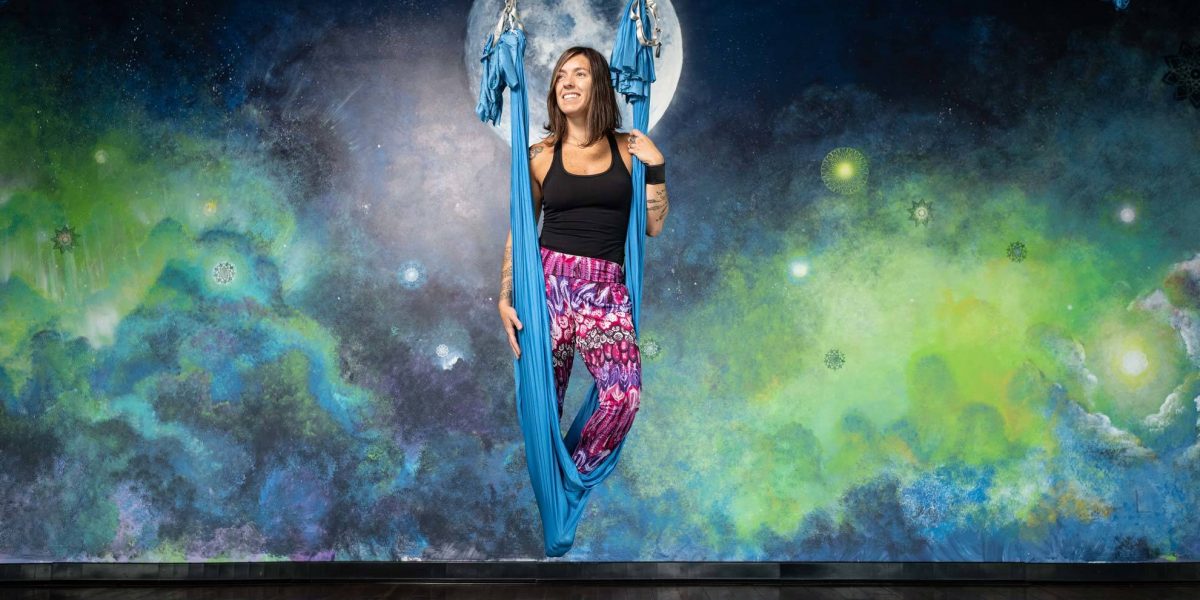Health & Wellness
Cameo: Lola Manekin
We talk to the founder of Movement Lab in Remington.
This month marks the third anniversary of your wellness and fitness studio, Movement Lab.
What do you think draws people to it?
Everything we carry emotionally is in our bodies. We can process that mentally, but until we move a heavy emotion out of our bodies, it’s still stuck somewhere. Anytime we’re opening our bodies, it’s like we’re digging deep into those places and we don’t have to hide anymore, the emotions
just come on up. And our students come back. That’s how we know that they’re understanding—it’s physical. A class can be a deep, deep experience, but it doesn’t have to be. It can be a girl’s night out and you sweat it out and grab a beer downstairs later. Whatever people need in
that moment, we got you.
What aspects of your hometown, Florianópolisi, Brazil, have influenced your vision for the lab?
If you watch Brazilians, there’s a lot of freedom in their bodies. I think that’s the biggest gift—their authenticity as a culture. If I am to be in Baltimore, it’s about how I can bring as much of that experience here. I grew up free on the island Florianópolisi, where our movement was running in the dunes and jumping on trampolines. There’s always much more fun in the movement that we do there. I never feel like I’m getting a workout. I think by now [Movement Lab] is known for offering unique classes. We don’t have conversations about weight loss, and it’s not even fitness—it’s like this is your playground. We want everyone to come in and belong somewhere, feel like a part of something bigger than themselves, and work, dance, sweat, and do good.
Where did your wellness journey begin?
We grew up in this natural world and my mom would take us to every shaman to heal us before we took aspirin. So, that was behind it all. When I studied natural therapies in college, that’s what I thought I’d do for the rest of my life until I found Nia. My sister-in-law had taken this [fitness] class in New York, she’s like “it had dance, and yoga, and martial arts,” so I Googled it and I discovered Nia. I immediately signed up for training. There were no classes here, so I went, and I fell madly in love with it and I knew I wanted to share that.
How has immigrating to America shaped your views as a business owner?
Part of my process in becoming a citizen was gaining so much gratitude. I moved to Florida in 2004 just to get work experience. I took jobs as a waiter, cleaned houses, and babysat. But I had finished college [in Florida] in natural therapies and, when it was time to go home, I decided to stay for massage school. Along the way, I just kept meet- ing the most amazing people who would open more and more doors to me. Everything that I’ve done and what has influenced me comes from a tremendous amount of gratitude.
Movement Lab also hosts some really cool events that branch away from fitness. What do these events and “playshops” bring to the experience?
As a culture here, it’s deeply ingrained that self-care is an act of selfishness and everybody else comes first. There’s an unequal weight of giving, giving, giving and not enough receiving. The massages and coaching are how can we support each human being to come back home from the disconnection to our bodies from various things: abuse, trauma, thinking “my body doesn’t look perfect.” It’s that idea of teaching that self-care is essential to a person’s wellbeing. The workshops we offer usually find ways of getting the mind, the emotions, and the spirit through the body.
How do the particular classes at Movement Lab promote a mind-body wellness connection?
When we go on vacation and we take those ten days, we’re rested. And then we come back and think of how to sustain those moments of feeling like you have yourself together. But days go by and life happens, and we forget. What if you can’t go to Costa Rica once a month, how do you get that experience? But it has nothing to do with Costa Rica—it has to do with how you felt there. It’s a feeling that we can get back to in some ways in our everyday lives. If we try to talk about it, it becomes mental, instead [I want my students to] feel it in their bodies. It’s physical. It’s not a conversation of “don’t forget to reach deep into yourself,” it’s “take the medicine and see what happens to your body.”
Reflecting on the journey of Movement Lab, what kind of growth have you experienced?
It’s teaching me what deep commitment looks like. I’ve always been a free butterfly and wherever the wind took me I went. So there’s a level of commitment and discipline that hasn’t really been a part of my DNA. It’s trusting the process. Surrendering more. Letting go of trying to control everything and micromanaging everything. Every time I find myself doing that, I lose track of the bigger picture.
What’s the bigger picture for you?
One of my favorite quotes is [by Howard Thurman]: “Don’t ask yourself what the world needs. Ask yourself what makes you come alive, and go do that, because what the world needs is people who have come alive.” There are many moments where I wonder how I am contributing to the world by owning a studio. And then I had this realization last year that the way I am contributing is by having a space for people to come into their aliveness, so then they can be themselves. That’s my contribution here—reminding people who they are.
